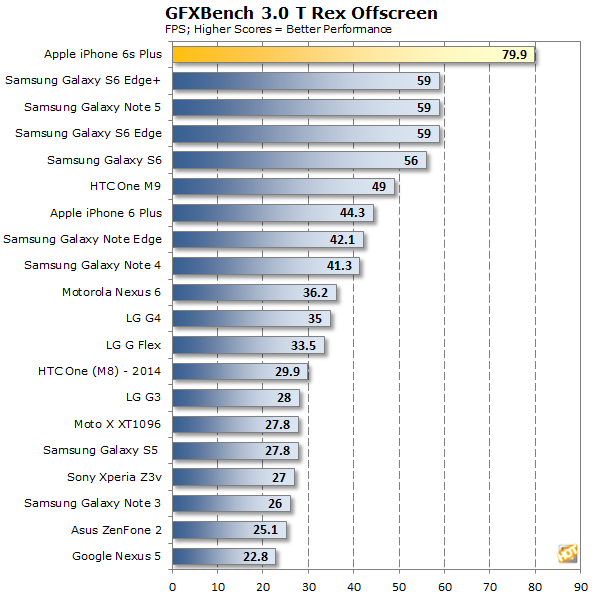Underneath the hood of
Apple's new iPhone 6s and
iPhone 6s Plus models is a new custom designed System-on-Chip (SoC) that Apple has dubbed its A9 processor. It's a 64-bit chip that, according to Apple, is the most advanced ever built for any smartphone, and that's just one of many claims coming out of Cupertino.
Apple is also claiming a level of gaming performance on par with dedicated game consoles and with a graphics engine that's 90 percent faster than the previous generation. For compute chores, Apple says the
A9 chip improves overall CPU performance by up to 70 percent. These performance promises come without divulging too much about the physical makeup of the A9, though Apple did say it's using a new transistor architecture that's optimized for real-world use.
 Source: Apple
Source: AppleThere are some educated assumptions floating around. According to the teardown geeks at Chipworks, the A9 chip likely contains a dual-core CPU and six-core GPU flanked by 8MB of L3 cache (up from 4MB in the A8) and 3MB of shared L2 cache.
Good luck getting Apple to confirm or deny any of those specs. One of the few technical details Apple has been willing to share is that the M9 motion coprocessor is integrated directly into the A9 chip. Apple also acknowledged bumping the amount of RAM up to 2GB in the new iPhone 6s models.
Technical specs aside, does it live up to the hype? It just so happens we have an iPhone 6s Plus 64GB model in-house that we're in the process of evaluating. We've had time to run some preliminary benchmarks, which we've decided to share ahead of a full review.
Geekbench

In Geekbench, the iPhone 6s Plus performed second only to Samsung's newest Galaxy models in multi-core performance and beat the iPhone 6 Plus by more than 50 percent. Switching our attention the single-core numbers, the iPhone 6s Plus scored significantly higher than every other smartphone. What's surprising here is that Samsung's octal-core
Exynos chips in the Galaxy S6 line aren't that far ahead of the A9's dual core arch. The Apple A9 appears to be doing significantly more work with fewer cores.
SunSpider

In SunSpider, which is a JavaScript processing benchmark (indicative of web rendering performance on the CPU, rather than GPU), the iPhone 6s Plus took the top spot in convincing fashion.
GFXBench 3.0

Clearly Apple put a high priority on graphics performance. The iPhone 6s Plus tamed GFXBench's T-Rex to the tune of 79.9 frames per second, which is around 80 percent faster than its predecessor. It's also a full 20+ fps faster than Samsung's Galaxy S6, S6 Edge,
S6 Edge+, and
Galaxy Note 5 handsets.

To level the playing field in GFXBench's fill rate test, we use the 1080p offscreen option so that scores aren't influenced by varying resolutions. This test shows simple raw fill rate, which is the number of pixels the GPU can write to memory per second. At a glance, you'll notice the iPhone 6s Plus trailing a handful of devices from a few different manufacturers. There's room for improvement here, but if you look closer, you'll see the iPhone 6s Plus with its A9 chip is more than 76 percent faster than the iPhone 6 Plus with its A8 engine. Good stuff. And as you'll see, fill rate doesn't always translate to the same performance curve in all graphics workloads.
3DMark

Here again the iPhone 6s Plus leads the pack with the highest overall Ice Storm and Graphics scores. Its physics performance couldn't quite keep pace with the front runners, though it isn't bad in and of itself.

There's no doubt about it, the GPU inside the A9 has some serious horsepower. It pushed over 220 fps in the GT1 test and stretched our graph out.
Stay Tuned
There's a lot more to the iPhone 6s Plus than what we've just shared. Though it's an incremental step in the ongoing evolution of the iPhone, the 6s Plus sports some fancy new tricks, like Live Photos, an improved camera, and 3D Touch. It might also
(unofficially) be waterproof.
If you haven't done so already, be sure to bookmark
HotHardware.com and check back often. We'll have more performance benchmarks and plenty of analysis in our full review.









